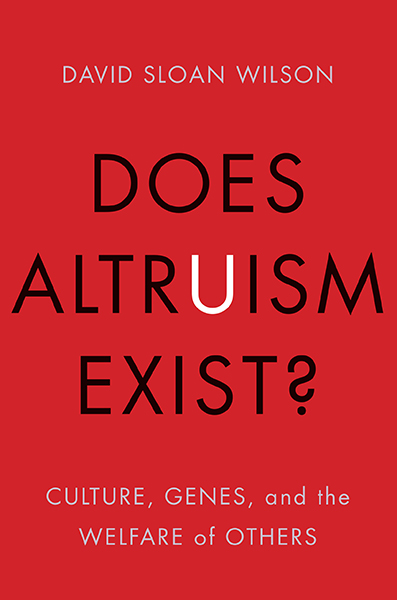In his book, Does Altruism Exist?: Culture, Genes, and the Welfare of Others, evolutionary biologist David Sloan Wilson takes on the intriguing and much debated question of whether people serve others out of genuine concern for their welfare or if all charitable actions stem from some form of self-interest. Before he examines this question, he starts with interesting facts about altruism. Take the word “altruism” itself; it didn’t even exist until 1851, which begs the question, why has this word not been useful throughout all of time?
Much of Wilson’s study focuses on the behavior and interaction of biological groups, such as honeybees, whose lives are by nature dependent on each other. His findings from a variety of such creature studies conclude that selfishness beats altruism within groups themselves, while altruistic groups beat selfish groups. Said another way, a group filled with selfless and brave warriors will survive longer than a group with self-centered and cowardly ones. But such a conclusion does not tell the whole story; many other factors come into play. For example, doesn’t the self-sacrificing, brave warrior gain more from being that way than from participating in a culture of deserters?
In the chapter, Altruism and Religion, Wilson explores the role religion plays in the evolution of altruism with the distinct ability to create highly motivated and well organized groups. He notes that while they are functionally similar, religions vary widely in what he calls the “proximate mechanics” of that evolution. In the chapter following,Wilson givens an equally interesting look at the interrelation between altruism and economics. He points out that the idea that a society can run itself without having interest for the individual welfare of others is a central theme of economics. It might be surmised that economics, if run on the basis of market forces alone, leaves no room for goodwill. Wilson does not conclude this however; he shows how many related studies, books and opinions weave into a larger picture of the role of altruism in economics. The book considers the larger question: Should altruism be defined by feelings and emotions towards other people, or does it have less touchy feely roots but still with the benefit of others as the end result?
Writing as an evolutionist, readers will find Wilson’s study of Cultural Evolution rich and fascinating. He shows how “all societies that function well require mechanisms that coordinate action and prevent exploitation from within.” He writes, “Whether these mechanisms count as altruistic or selfish, defined in terms of thoughts and feelings, is irrelevant, as long as they do the job in terms of actions.” For me, these statements reflect my “take away” after reading the book.
In the end, Wilson defines most of the ideas in his book as foundational, from which to build upon, while others are more provisional. His concluding statements instruct us all, encouraging societies of today to choose policies that have the whole world in mind. If we want the world to be a better place, we must become planetary altruists. We must take into consideration all of the groups affected by our choices, from the smallest creatures on up to mankind, and whether for their sake or our own, make choices that support all life.

